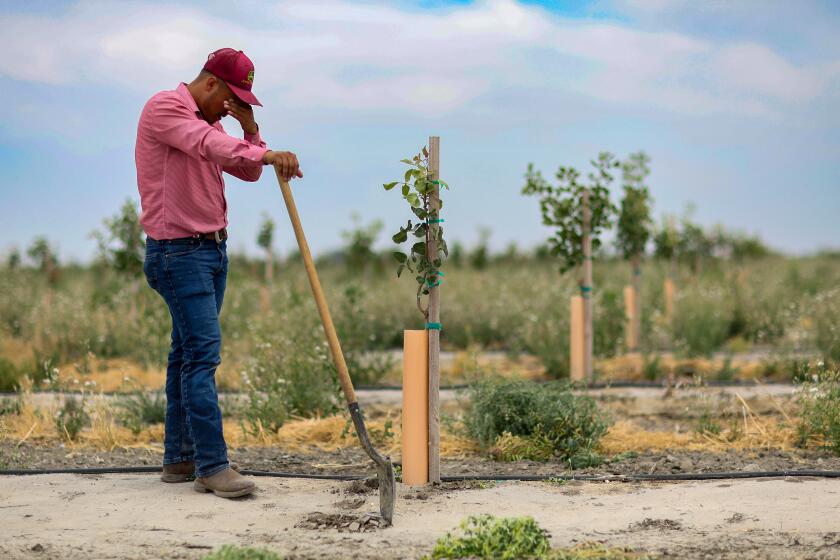What’s That?The American Cancer Society’s Discovery Shop...
What’s That?
The American Cancer Society’s Discovery Shop in Northridge will hold an estate sale Sunday, and if early 20th-Century oddities are your passion, this one’s for you.
Along with clothing, quilts, linens and collectible Depression glass, there will be a set of dentures in the original box, a carton of Carter’s Little Liver Pills, an original Little Brown Jug and a fox boa.
Also, a box full of glass beads, each wrapped with a handwritten note inside, as well as sheet music, old advertisements, wooden crochet hooks and a box that says the pills enclosed are to help jockeys lose weight.
A check with any galleria will confirm that you can’t get these things just anywhere.
The society came into possession of 50 boxes of these curiosities because of the generosity of an anonymous donor. The donor acquired them when her 87-year-old aunt left the South-Central Los Angeles house where she had lived all her life and moved into a nursing home.
“It really is a wonderfully strange collection,” said Discovery Shop manager Jill Angel.
Angel said the niece recently contacted the shop in high dudgeon after an estate appraiser had looked down his nose at the results of her aunt’s lifelong passion for collecting. “She said she wanted our charity to have it and to have some fun with it,” Angel said.
So Angel and her staff of volunteers arranged the sale, to be held from 1 to 5 p.m. at the shop, 9719 Reseda Blvd.
There were moments, Angel said, when she wasn’t sure just what she’d gotten herself into.
“When we started to unpack the 50 boxes, we kept holding things up and trying to figure out what they were,” she said, and some things caused volunteers to shake their heads, such as the case of theatrical supplies with old makeup.
“It is clear, from looking at these things, that the woman had an interesting life and she never threw anything out,” Angel said. In fact, when the niece checked out her aunt’s home, she found sets of old pots and pans under the bushes and glassware under the beds.
Angel said there are nice things in the collection, but a lot of kitsch.
“We kept expecting to find a painting on velvet somewhere in one of the boxes,” she said, laughing.
No such luck.
Grand Feats
Podiatrist Michael Zapf has a practice in Agoura, teaches at County-USC Medical Center and, for the past three years, has taken a busman’s holiday to Tijuana or Mexicali once a month.
Along with a dozen or so other Southern California doctors who form the informal volunteer group known as the Baja Crippled Children’s Project, Zapf goes to a Rotary International clinic in each of the Mexican cities and donates his time and skills to people who can’t afford to pay.
“There are 12 or 14 doctors who go down from Los Angeles to work at the clinics,” Zapf said. “When it is my weekend, I leave Agoura Friday evening and put in a full day on Saturday, sometimes performing scheduled surgery late Saturday afternoon.”
It’s needed.
“A lot of the children we see have serious foot problems, particularly club feet,” Zapf said.
“This is something that would be taken care of in the first few years of life in the United States, but in Mexico, poor families have to let it go. After a few years, the child is literally walking on his ankle.”
He cites one family who came into the Tijuana clinic a couple of years ago. Seven of the eight children had club feet.
Zapf and the other doctors corrected the feet, beginning with the youngest child. It fell to Zapf to correct the severely deformed foot of 12-year-old Maria. After several operations, she could put a shoe on the foot for the first time.
“I’ve had men thank me for fixing their feet because they could then ask someone to marry them. I’ve had women thank me for making them feel whole. But I will never forget Maria,” Zapf said.
“Her aunt said she couldn’t stop crying. She was so happy because for the first time in her life, the kids at school wouldn’t make fun of her.”
Closing Shop
For 37 years, John Whitaker has taught industrial arts at Pacoima Junior High School.
He was recruited from Utah State College in 1953, when the junior high was new.
A Washington native, Whitaker had served in the Air Force, worked as a Mormon missionary in Uruguay and was married with two children. He looked at going to California as a big adventure, and California hasn’t let him down, he said. Nor has the school.
He says it’s been a good 37 years.
Whitaker says the school’s most famous graduate was Ritchie Valens, or Richard Valenzuela, as he was known in his student days. “He was in my class and was always working on guitars,” Whitaker recalled. “He was a nice boy and got a good grade from me.”
The school’s most dramatic moment came when a transport plane and a jet collided overhead in the spring of 1957. “We had 600 kids in the auditorium when one of the planes landed in the school yard. Outside, five children were killed. We had to keep order inside so the kids wouldn’t panic,” he said.
Whitaker, who for years resided in Arleta, has good memories of his students and his community near the school. When he moved here, the area was largely Anglo, he said. “Now it’s mostly Latino, which makes me happy I learned Spanish for my Mormon mission so I can talk with my neighbors.”
Recently, Whitaker closed the door on the industrial shop for the last time. His retirement day had come. “My wife and I are going to visit with our eight children and our 17 grandchildren,” he said. “They’re all grown now and living in different places around the country.”
But he’ll miss his school.
“I loved the teaching,” he said. “It was a good line of work.”
Overheard
“My teen-ager doesn’t think money grows on trees. She’s thinks they give it away at the ATM.”
--Woman to friend
at Gelson’s in Encino
More to Read
Sign up for Essential California
The most important California stories and recommendations in your inbox every morning.
You may occasionally receive promotional content from the Los Angeles Times.






